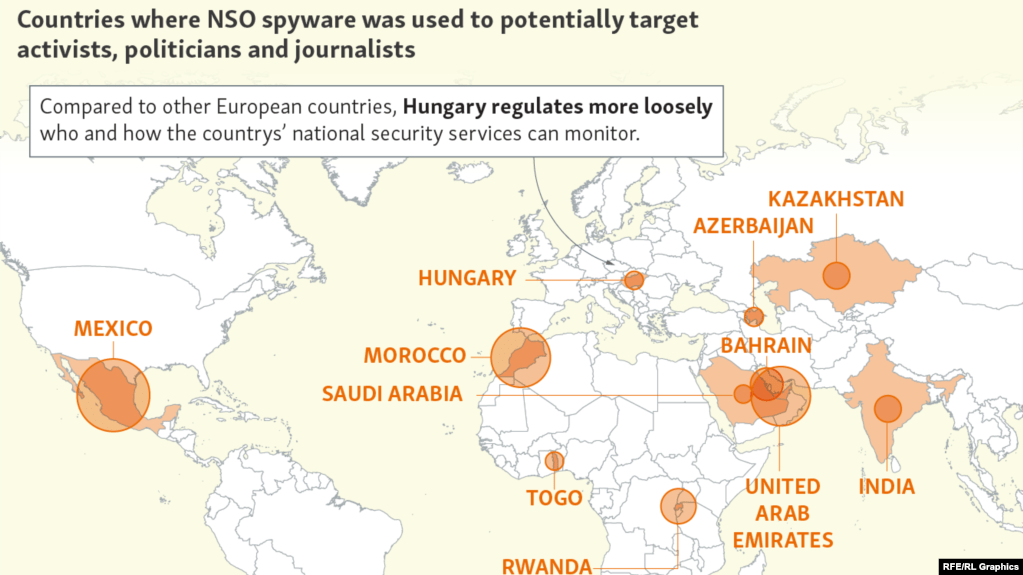RFE/RL Outraged By Pegasus Project Revelations Involving Azerbaijani Service Journalists
RFE/RL President and CEO Jamie Fly expressed outrage at revelations that the smartphones of RFE/RL journalists may have been targeted for infection with the Pegasus spyware application.

WASHINGTON, D.C. — Radio Free Europe/Radio Liberty (RFE/RL) President and CEO Jamie Fly expressed outrage at revelations that the smartphones of at least five former and current Radio Free Europe/Radio Liberty (RFE/RL) journalists working for its Azerbaijani Service may have been targeted for infection with the Pegasus spyware application.
“It is outrageous that in the 21st century, so many governments seek to block free expression and prevent journalists from providing objective news and information to their fellow citizens,” Mr. Fly said. He added, “RFE/RL strongly condemns this cowardly invasion of the privacy of working journalists. We have long highlighted the abusive practices of the Azerbaijani government against our Azerbaijani Service, Radio Azadliq. We call on the Azerbaijani government to stop blocking our website, halt its surveillance of our staff, and to cease its harassment of our former bureau chief Khadija Ismayilova.”
An investigation by 17 media organizations and the Organized Crime and Corruption Reporting Project (OCCRP), released late on July 18, has drawn links between the Israeli-based NSO Group, accused of supplying spyware to governments, and a leaked database of up to 50,000 phone numbers believed to have been identified as people of interest by clients of the company since 2016.
The NSO Group clients included the governments of Azerbaijan, Bahrain, Hungary, India, Indonesia, Kazakhstan, Mexico, Morocco, Rwanda, Saudi Arabia, Togo, and the United Arab Emirates, according to the report.
Ms. Ismayilova was chief of RFE/RL’s Azerbaijani Service’s Baku bureau in 2008-2010, before embarking on deep investigative reporting in the years that followed, exposing corruption linked to members of Azerbaijani President Ilham Aliyev’s family. She was imprisoned in December 2014 and Azerbaijani authorities raided and forcibly closed RFE/RL’s Baku bureau. Ismayilova was released from prison in May 2016, but prohibited from traveling abroad until earlier this year.
RFE/RL’s Azerbaijani Service was banned from local FM airwaves by Azerbaijani authorities in 2009; in 2017, an Azerbaijani court satisfied a government request to ban access to the Service’s website, azadliq.org. In addition to the persecution of Ismayilova, the Service’s journalists have been the targets of abductions and death threats, arbitrary detentions, physical attacks, and attempts to intimidate family members, none of which were investigated by Azerbaijani authorities despite repeated requests by RFE/RL management.
Despite the Azerbaijani government’s assault on its journalists, RFE/RL’s Azerbaijani Service, known locally as Radio Azadliq, remains an indispensable source of independent news in the country, actively publishing text, audio, and video content on the web, via satellite, and on Facebook, YouTube, Instagram, and other digital platforms.
For more information, contact press@rferl.org.
###
About RFE/RL
Radio Free Europe/Radio Liberty (RFE/RL) is a private, independent international news organization whose programs — radio, Internet, television, and mobile — reach influential audiences in 23 countries, including Russia, Ukraine, Iran, Afghanistan, Pakistan, the republics of Central Asia and the Caucasus. It is funded by the U.S. Congress through USAGM.